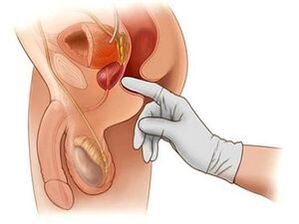Currently, the question of how to diagnose prostatitis worries more than half of men. Now we are talking about the stronger sex in the age group of 30-35 years, but this figure is declining, and young people may also suffer from this disease. At the first signs it is necessary to consult a urologist and receive treatment. To do this, it is important to know how to recognize prostatitis on your own.
Signs of acute form
In the acute form, it is very easy to understand how to diagnose prostatitis in men. In fact, it is an inflammatory process caused by complications after a common cold. This can be hypothermia, SARS or acute respiratory infections. It is a viral, fungal or bacterial infection that accidentally enters the prostate gland.

In this situation, there are several symptoms of prostatitis - and how to diagnose it is easy for everyone:
- The temperature is above 38 degrees.
- Nausea and vomiting due to intoxication.
- Cold and weakness.
- Muscle pain.
- Anxiety in the lower abdomen.
- Pain when urinating.
- A small amount of blood in the urine.
- Sexual dysfunction.
In this case, you should immediately contact a specialist. The main feature of the acute form is that it can be treated quickly and easily. After a course of treatment and recovery, a man can be sure that he will get rid of all symptoms, including the normalization of sexual function.
Symptoms of chronic disease
The chronic form is a bit more dangerous. In this case, the symptoms are more stable, requiring long-term complex treatment. Often, relapses can occur even after that. You need to see a doctor as soon as possible, there is only hope of recovery with early exposure. Symptoms include:
- The temperature rises to 37 degrees. This does not happen continuously, but intermittently.
- The desire to go to the toilet often. At the same time, urination is disturbed, the jet is very weak.
- Pain symptom. Unpleasant sensations may be felt in the sacrum and scrotum.
- Erectile dysfunction significantly impairs sexual life.
All these symptoms are of great concern to any member of the stronger sex. Therefore, it is important to know in advance how to understand if you have prostatitis and take action.
Unlike other diseases
It is difficult to learn about the disease yourself. Symptoms may be similar for different diagnoses. Men suffer from problems with the genitourinary system for several reasons. These can be common diseases:
- Orchitis and epididymitis irritate the testicles. As a result, there may be similar symptoms, in addition, there will be sharp pain when touching the scrotum.
- Urethritis is accompanied by sharp pain in the urethra, sometimes in the abdominal cavity in case of complications.
- Cystitis is accompanied by a desire to go to the toilet regularly and is often associated with urethritis.
- Pyelonephritis means kidney problems, back pain, and blood in the urine.
Most of the symptoms are really very similar. Therefore, prostatitis should be diagnosed only by a specialist. The specialist will conduct a full examination and select the individual treatment.
Professional diagnostics
Given that the symptoms may be similar to many other diagnoses, if any symptoms appear, you should consult a doctor and do not self-medicate. The doctor should conduct a thorough examination:
- Rectal palpation. Through the large intestine, the doctor will be able to feel the prostate and assess its condition and size.
- Cytology. A sample of prostate secretion is sent to a laboratory and tested for various bacteria and infections.
- Urine analysis. Make sure you do it in a special way. For one trip to the toilet, three glasses are filled: at the beginning, end and middle of urination.
- Ultrasound examination of the prostate is performed rectally, the device can be used to examine the prostate gland and its surroundings.
- Rheography is performed using electrodes, and the prostate gland's response to irritation is measured.
- Uroflowmetry examines urinary problems. This applies to speed, duration and the time between trips to the toilet.
Most men delay going to the doctor until the final stage. Indeed, the examination is not very pleasant and embarrassing, but you need to protect your health.
Often at a stage of chronic development, even a specialist can not help solve the problem, the symptoms do not disappear completely. It would be better to see a doctor once and get better than to suffer from erectile dysfunction and urinary problems for the rest of your life.





























